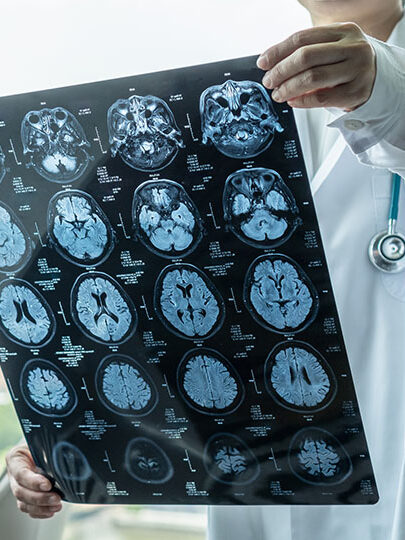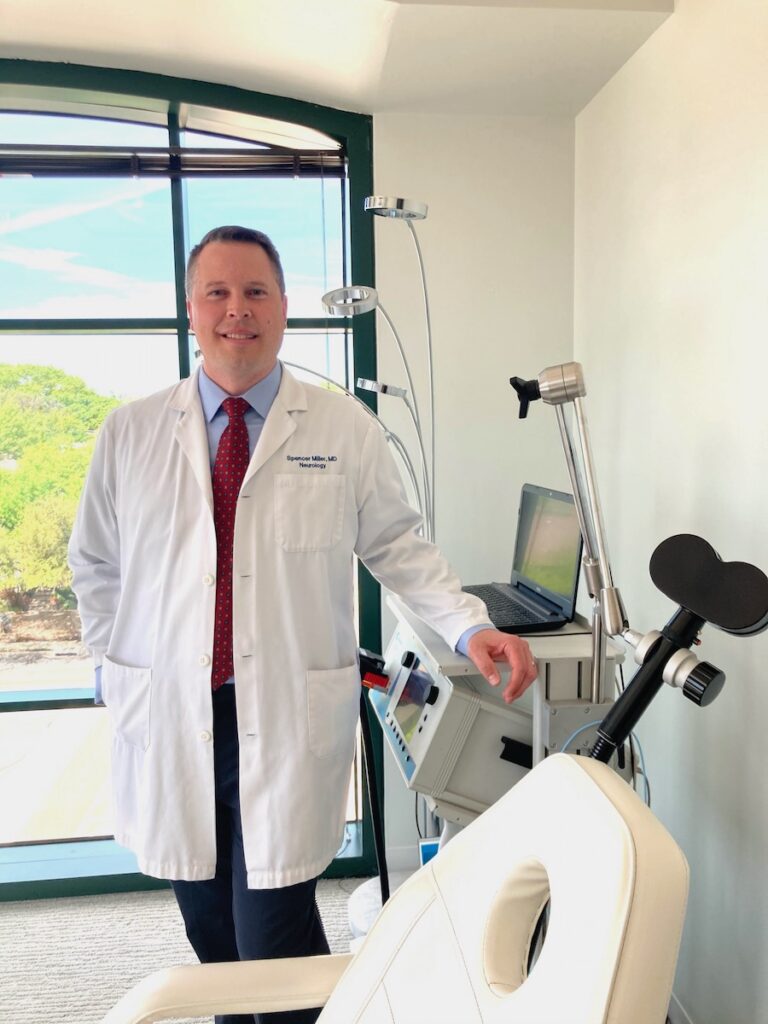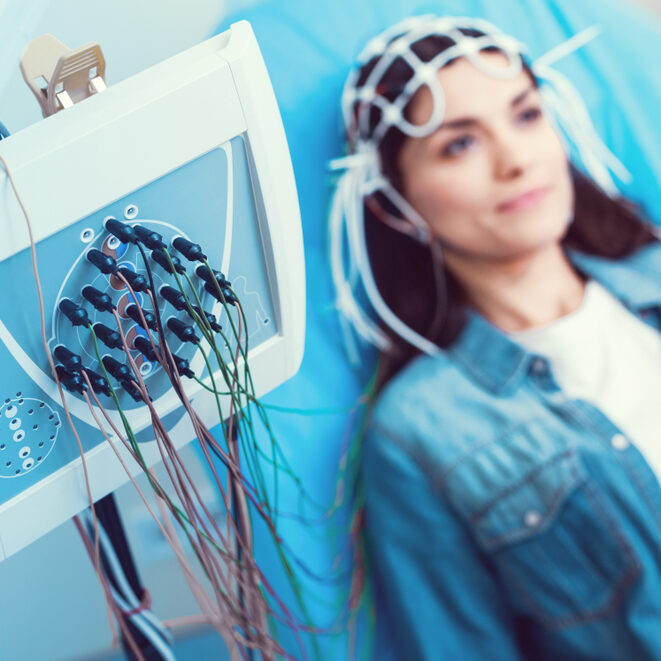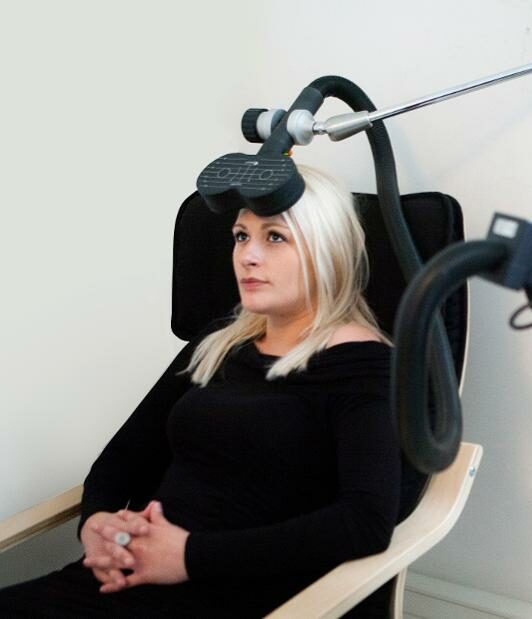
Memory Loss and Early Stages of Dementia: How MeRT Can Help
Memory problems that disrupt daily life may signal early dementia, not just normal aging.
Early detection and treatment can help maintain independence longer.
MeRT offers personalized, non-invasive treatment that may improve brain function and memory.
When Does Memory Loss Become a Real Concern?
We all forget things sometimes. Misplacing keys or forgetting a name now and then is normal, especially as we get older. But when memory problems start interfering with your daily life, it might be time to pay closer attention.
Early detection of serious memory issues is important. Getting help when you first notice things can slow down problems. And this can help you or your loved one live a better life, longer.
But how do you know if you have memory loss or the early signs of dementia? And more importantly, is there anything you can do to slow down dementia’s progression?
We think so. Neurologist Dr. Spencer Miller has brought MeRT®, or Magnetic e-Resonance Therapy, to Plano, Texas.
MeRT is a non-invasive, drug-free, and effective way to optimize brain performance. It’s gentle, well-tolerated, and can help you regain clarity.

Contact our
New Patient Coordinator
Or fill in the form at the bottom of the page for more information.

Memory Loss vs. Dementia: What’s the Difference?
Normal Memory Loss
- Forgetting where you put your glasses
- Missing an appointment once in a while
- Taking a moment to remember someone’s name
Concerning Memory Loss
- Getting lost in places you know well
- Asking the same questions over and over
- Forgetting the names of close family members
- Having trouble following simple directions
What Is Dementia?
Dementia is not just memory loss. It’s a condition that gets worse over time and affects how your brain works. It can change your memory, judgment, and ability to speak or understand. Common types of dementia include:
- Alzheimer’s disease (the most common type)
- Vascular dementia
- Lewy body dementia
- Frontotemporal dementia
Early Signs and Stages of Dementia
It’s important to recognize the early signs of dementia so you can take action sooner.
Warning Signs of Early Dementia
- Forgetting information you just learned
- Having trouble with everyday tasks like cooking or paying bills
- Getting confused about what day it is or where you are
- Struggling to find the right words
- Making poor choices that seem unusual
- Pulling away from friends and family
Stages of Dementia
Mild Cognitive Impairment (MCI):
- Trouble remembering recent conversations
- Difficulty making decisions
- Increased need for reminders
Mild Dementia:
- Forgetting names and events more often
- Trouble with problem-solving
- Personality changes and mood swings
Moderate Dementia:
- Increased confusion and disorientation
- Needing help with daily tasks
- Trouble recognizing family and friends
Severe Dementia:
- Loss of ability to communicate
- Loss of physical abilities (walking, swallowing)
- Needing full-time care

Why Early Treatment Matters
Dementia is a progressive disease, which means it gets worse over time. But starting treatment early can help slow down the progression and improve brain function. MeRT may help protect brain health and maintain cognitive abilities for longer. And that can give you more time to stay independent and engaged in daily life.
How MeRT May Help with Memory Loss and Dementia
MeRT is a noninvasive treatment that uses magnetic pulses to improve brain function. It works by identifying areas of the brain that aren’t functioning properly and stimulating them to restore healthy brain activity.
How MeRT Works:
- Brain Mapping. We start with a qEEG (quantitative electroencephalogram) to measure brainwave activity. This helps identify areas where brain function is out of balance.
- Personalized Treatment. Based on the EEG results, we create a customized treatment plan of TMS, where we apply magnetic pulses to the brain to target the affected areas.
- Restoring Brain Function. The goal is to improve brainwave activity, strengthen connections, and boost cognitive function.
Potential Benefits of MeRT for Memory Loss and Dementia:
- Enhanced mood and overall mental sharpness
- Improved memory and recall
- Better focus and mental clarity
- Reduced confusion and disorientation
Our Medical Director, Board-Certified Neurologist Dr. Miller
Spencer O. Miller, MD, is the owner and Medical Director of the Brain Treatment Center Plano and also the Brain Treatment Center Dallas. He is a board-certified neurologist in Dallas, Texas, who has been in practice for 12 years.
Dr. Miller specializes in MeRT treatment of traumatic brain injury, depression, anxiety, post-traumatic stress disorder, dementia, autism, and many other brain disorders.
He also works with Baylor University Medical Center, where he specializes in stroke, headache medicine, traumatic brain injury, post-traumatic stress disorder, and seizure. Additionally, he is associated with the Texas A&M Science Center College of Medicine.


Finding Out if MeRT is the Right Treatment
We understand MeRT is a relatively new treatment, and you may not be certain if this is right for you. But you don’t have to make this decision right away or all alone. Your first step is a simple phone consultation with our New Patient Coordinator. Here, you can discuss your symptoms and history, ask all the questions you want, and have her explain the protocols, fees, and details of treatment.
Step 1
Testing and Consultation
If you are interested in taking the next step in seeing if MeRT treatment is right for you, we can set up an appointment for an EEG (brain scan) and a second appointment for a consultation with the doctor to talk about your symptoms and the results of your EEG. Each of these appointments is about 45 minutes to an hour.
At the first appointment, our neuro technician will perform an EEG and an EKG. Both are simple, painless, and non-invasive tests to see exactly what is happening in your brain.
A few days later, when your test results are in and analyzed, you’ll have a one-on-one consultation with the doctor. You can attend this appointment virtually from the comfort of your home. Here, you can discuss your test results, get answers to questions you may have, and together determine if you are a candidate for treatment.
Step 2
The Assessment Period
If you and the doctor then decide to move forward with MeRT, the next step is what we call the Assessment Period. Here, we will perform a short period of several days of treatment, followed by a new EEG to see if you’re responding to the treatment. We assess this based on the new EEG results as compared to the initial one done before treatment started, as well as symptom improvements.
Step 3
Continued Treatment
If there is a positive response to treatment during the assessment period, you’ll have likely noticed some improvements. At that point, we can schedule the additional treatment duration. We perform treatments daily, Monday to Friday, in two-week increments. A typical treatment session takes about 45 minutes.
You’ll sit in a chair while the neurotechnician administers the treatment via a hand-held magnet near the scalp. We deliver the magnetic impulses for 6 to 8 seconds each minute. You may feel a slight sensation while the treatment is occurring, but it isn’t painful. We use no medications, and you remain fully awake.
MeRT treatments will usually go for anywhere from 4 to 8 weeks. Sometimes, we recommend additional treatment time to get the best results from MeRT. Each person is unique, and protocols may vary. Plus, your provider will have regularly scheduled follow-up EEGs and meet with you to manage your progress closely.
Contact Our New Patient Coordinator for More Information
Our New Patient Coordinator is here for you. During your free consultation, she will take the time to answer any questions you may have, listen to your concerns, and carefully explain all the details and information you need.
If, after talking to her, you are interested in further exploring whether you could benefit from MeRT for memory loss, the next step would be to schedule your EEG and a consultation with our doctor.
With thorough diagnostics, the doctor can show you what’s happening in your brain and what may be causing your issues. At this point, we can determine whether you may benefit from MeRT treatment, and you can decide if you want to move forward.
Life Can Be Better
With so many successful treatments, we encourage you to explore the possibilities of MeRT. If it’s right for you, it can have a lasting impact—and you can enjoy a greatly improved quality of life!
Or fill in the form below, and we will contact you.

Contact Form

Insurance Coverage and Payment Options
Currently, rTMS is only FDA-cleared to treat depression. However, we can provide you with all the appropriate paperwork at the end of your treatment so that you can submit it to your insurance company for possible reimbursement.
Some patients have reported that, depending on their health coverage, they have been able to receive some reimbursement for EEGs, clinical evaluations, and treatment. Medicare patients have reported that their coverage does not reimburse the treatment itself.
We accept all major credit cards, including Visa, MasterCard, American Express, and Discover.

